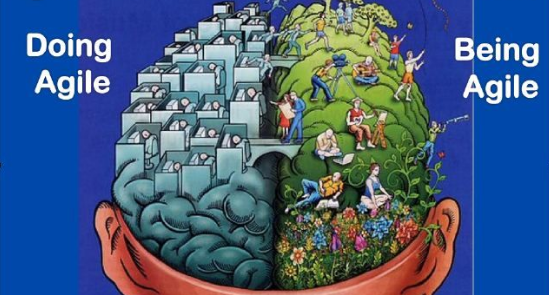It is hard to draw a definite line between doing and being Agile. Both approaches lead to certain benefits: improved communication, visibility of work performed and increase in productivity. You can follow the rules of the Agile world and be just fine. It is important to find the right balance and try to move your approach around these two.
Being Agile vs Doing Agile

Maybe doing Agile is enough for you and your organisation. Perhaps you do not need anything else. Where is the balance?
My story
I wouldn’t say it is a bad thing. I will give myself as an example – I started working in a Scrum Team as a developer (software quality assurance engineer to be precise), and I just followed the rules set by our implementation of Scrum. We were doing just fine. My first years as a Scrum Master, I followed the same pattern – stick to the rules set by the book because they work. It is efficient. Of course stopping there is another kettle of fish. It is a good starting point, but stopping here may result in a lack of engagement and other misplacements.
Switching point
After few years I’ve started to see what is underneath the Agile surface – consistently, predictably responding quickly in the face of change, close collaboration with customers to meet their needs and achieving excellence through engaged employees whose all working together towards common goals. I was able to see the reasoning of why Agile works in the first place. I started to notice values and to switch my mindset.
Thanks to living in peace with Agile values and mindset, I was able to ignite the passion in my team and then do the same on the organisational level – even if we were not working in any Agile method. We were Agile by heart.
Find the balance
It is an example of self-awareness path around Agile which I took. You can start with “doing” and then move on to “being”. You can also start from the opposite side – by developing soft skills first, value them and then move on to practices which can help you achieve results. I know great Agile Coaches and Scrum Masters from outside of IT world – they just started as psychologists, sociologists, managers… they could achieve great results thanks to their approach which is coherent with Agile Mindset. It is not something new – Agile rediscovers and renames set of behaviours and rules of modern society and up to them in the frame of delivering value to these in need.
Boundary of Agile
The new version of the Scrum Guide was recently released. After almost a month since the update, I did not see any developer interested in these changes. Scrum Masters and Agile Coaches seized a whole conversation. I think the reason behind it is our approach to Agile, the I-know-everything approach: We are responsible for their process, and we should take care of it. I think we missed the point: In Agile, and Scrum particularly, people who are working within a process should take care of it and organise their work to support its outcomes.
Developers may not see enough space for them to act. We limited their ability to create their environment so hard, and we pushed them away from doing Agile. They are just gears in the machine; tools used to meet others need. It is counterproductive. Scrum has its boundaries. Everything else – within these boundaries – should be organised by the team. And our role as Agile Coaches and Scrum Masters should be to give them that space within groups and organisations and show the higher levels of agility – the path from doing to being Agile (you can always raise this concern on your next upcoming meeting and use some powerful questions. See Facilitator’s Guide: Hello Silence, My Powerful Friend).

Next time, when you will be discussing any practice, involve people working within these constraints to have a valuable discussion. It is the first step to becoming Agile.
Being Agile
Being Agile is not about any practices, tools or processes. Of course – they are useful. If you want to gain from being Agile, you need something else. It requires courage from the organisation to give that power to people involved in operational and closer-to-the-ground work.
What can you achieve?
At first continuous learning. To be able to learn, you also have to make bad decisions and fail. That approach can be beneficial for everyone – it unlocks ownership over process (and then product), it lets people make decisions on-time decisions. But again – to be able to follow that path, the organisation has to build real leadership on all its levels. Only then employees can truly unlock their potential. You can be agile on all levels of the organisation, so do not blame it for your failures. Start small and then based on your results, unlock the change and balance your actions. It may be bumpy; it may stop for a while; however, there is no going back to how the organisation worked before.
If I can give you one advice and become Agile, it would be: engage everyone touched or involved in any way by your work to help and be an actual parent of this journey. The rest should emerge from it.





